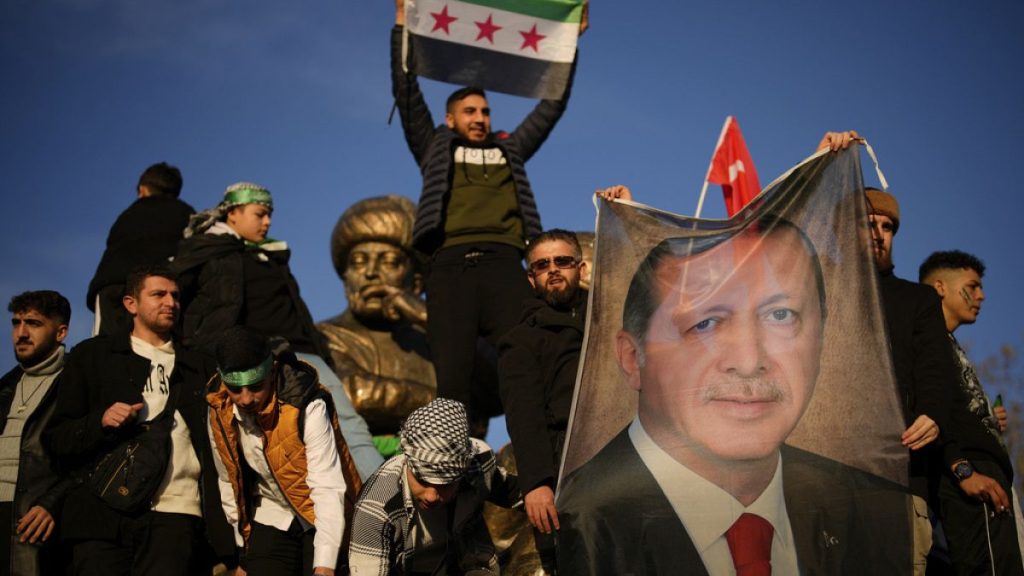Erdogan’s Vow: Territorial Integrity, Counter-Terrorism, and the Kurdish Question
Turkish President Recep Tayyip Erdogan, in his first cabinet address of 2025, reiterated Turkey’s commitment to upholding Syria’s territorial integrity amidst the dramatic political shift following the ouster of Bashar al-Assad. This commitment, however, is intricately linked to Turkey’s long-standing fight against Kurdish groups, particularly the Kurdistan Workers’ Party (PKK) and its perceived affiliates in Syria. Erdogan’s pronouncements come against a backdrop of heightened regional tensions, including Israeli airstrikes targeting Iranian-backed infrastructure in Syria, and Turkey’s own ongoing military operations against Kurdish fighters. His address underscores the complex dynamics at play as Turkey seeks to navigate the evolving Syrian landscape while simultaneously pursuing its own security imperatives.
Erdogan’s emphasis on Syria’s territorial integrity is not merely a statement of regional stability but a crucial element in Turkey’s broader counter-terrorism strategy. Ankara views the Syrian Democratic Forces (SDF), a Kurdish-led group controlling parts of northeastern Syria, as an extension of the PKK, which Turkey, along with several Western nations, designates as a terrorist organization. The SDF’s semi-autonomous enclave in northeastern Syria is perceived as a direct threat to Turkey’s national security, raising concerns about potential cross-border incursions and the establishment of a permanent Kurdish presence along its southern border. Erdogan’s warning of swift action against any perceived threats emanating from Syrian territory underscores Turkey’s determination to prevent the consolidation of Kurdish influence in the region.
The Turkish government’s stance on the Kurdish issue is deeply rooted in its decades-long conflict with the PKK, a struggle marked by violence and political instability. Erdogan’s reiteration of the "terror-free Turkey" objective highlights the enduring importance of this issue within the Turkish political landscape. While acknowledging the possibility of peaceful resolution, Erdogan’s veiled reference to using force suggests a continued willingness to pursue military solutions against the PKK and its perceived affiliates. The mention of imprisoned PKK leader Abdullah Öcalan hints at the potential for negotiations, but the insistence on the group’s complete disbandment sets a high bar for any peace process.
The evolving situation in Syria presents both challenges and opportunities for Turkey. The removal of Bashar al-Assad creates a power vacuum that could reshape regional alliances and power dynamics. Turkey’s engagement with the new power structure in Syria, as evidenced by Foreign Minister Hakan Fidan’s visit, underscores Ankara’s desire to play a significant role in shaping the country’s future. However, Turkey’s focus on combating Kurdish groups remains paramount. Ankara’s unwavering stance against the SDF, even in the wake of Assad’s ouster, indicates that the Kurdish issue will continue to be a central factor in Turkey’s Syria policy.
The interplay between regional stability, counter-terrorism, and the Kurdish question defines Turkey’s approach to the Syrian crisis. Erdogan’s pronouncements signal a continuation of Turkey’s established policy of opposing Kurdish autonomy in Syria and combating the PKK and its perceived allies. While Turkey has expressed support for Syria’s territorial integrity, its primary concern remains the prevention of a consolidated Kurdish entity along its border. This concern will likely drive Turkey’s engagement with the new Syrian leadership and its broader regional policy in the foreseeable future.
The future of Syria remains uncertain, with numerous actors vying for influence and control. Turkey’s involvement will be crucial in shaping the trajectory of the country’s reconstruction and its political landscape. However, Ankara’s preoccupation with the Kurdish issue and its commitment to counter-terrorism will likely overshadow other considerations. The challenge for Turkey will be to balance its security concerns with the need to promote stability and contribute to a peaceful resolution of the Syrian conflict. The effectiveness of Turkey’s approach will depend on its ability to engage constructively with other regional players and find a sustainable solution to the complex Kurdish question.














